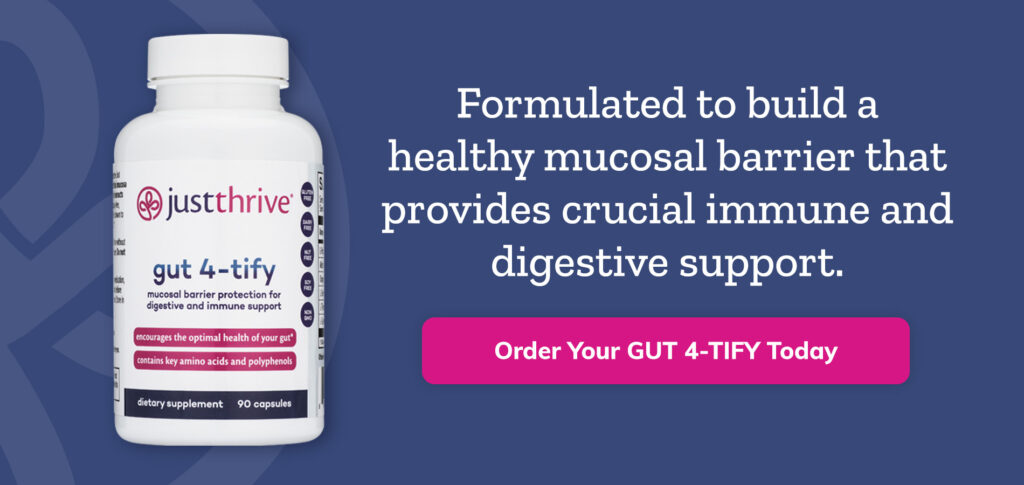Leaky gut syndrome is a difficult beast to catch.
Unless you’ve had CT scans and a confirmed intestinal perforation, it can be difficult to diagnose. The current scientific consensus is that most of us have leaky gut, to some degree.
Leaky gut is also called “intestinal permeability” in the medical community.
You see, the gut is naturally supposed to control what substances are allowed into the bloodstream. It does this by maintaining a secure barrier via the intestinal lining and by making sure the microbiome of the gut is diverse and thriving.
But if the gut lining is unhealthy, which can occur for reasons as variant as not providing it with the right nutrients or excessive alcohol use…
Then partially digested foods, chemicals, toxins, or other particles may slip through cracks in the intestinal lining and escape into the bloodstream, causing myriad issues.
So leaky gut is more like the gateway condition to many other health problems. (Problems like celiac, IBS, fibromyalgia, allergies, obesity, asthma, anxiety, and more.)
Especially in the West.
The American diet is so high in sugar and saturated fats, which starve the healthy bacteria in the gut, and low in fiber, which feeds the bacteria, that almost all Americans are suffering from leaky gut syndrome in one way or another.
Leaky gut is not a death sentence. There are tons of ways that we can proactively improve our intestinal integrity — from changes in our diet, to our sleeping habits, to our social activities.
We can also supplement the support we’re giving our guts in our lifestyles with over-the-counter vitamins from the drugstore.
In this post, we’re going to take a look at the four best vitamin supplements you can take to improve your overall gut health.
L-glutamine
L-glutamine is an amino acid native to your stomach lining. Its job is literally to repair the lining of your intestines.
Since it improves the growth of enterocytes (intestinal cells), it’s one of the good bacteria that isn’t given a chance to thrive when our diets are poor, or when you’re born with a gut condition.
Although some studies have shown that taking capsule doses of L-glutamine can help calm diarrhea and better absorb nutrients in your digestive tract, science hasn’t reached a consensus.
What we do know is that those amino acids are a vital component in maintaining a healthy gut, so taking them in supplement form only adds soldiers to your gut army.
Collagen Protein
Collagen is the most fruitful protein in your entire body. You’ve probably heard it referenced in terms of healthy hair, skin, and fingernails. It provides lots of support for most of your organs.
What is less known is that collagen aids in the rebuilding of the mucus lining of your intestines. As you can imagine, if that mucus lining is compromised or weak, your gut health suffers.
Collagen protein contains glycine, an antioxidant involved in protecting your cells, proline, which assists in joint and tendon operations, L-glutamine, which we know maintains your gut lining, and L-arginine, which helps regulate blood pressure.
It would make a welcome addition to your gut health maintenance routine.
Berberine
Berberine is a plant-based bioactive compound with many healing properties — antioxidant, anti-inflammatory, antibacterial, and antiviral.
It’s considered an ancient medicine, with rich histories in Chinese and Ayurvedic culture to fight diarrhea, gut parasites, inflammation, and bad bacteria.
We’ve traditionally used it to treat inflammatory bowel diseases, recent studies have suggested we can also use it to reduce the permeability of the intestinal lining.
This is because it feeds the healthy flora of your intestines. Like we’ve said, it’s all about stacking your army with the odds in your favor.
Zinc
Although zinc is a very common element taken as a supplement, and supports a whole host of other functions beyond digestive health, it’s also been shown to be very effective in strengthening your intestines.
If your body is low on zinc, the sensitive junctions in your intestines become disrupted and more susceptive to permeability.
A study from 2015 even showed that zinc could tighten up those junctions.
It’s made particular strides in aiding those with Crohn’s disease.
Moreover, if your body is low on zinc, those sensitive areas become disrupted
Bottom line? Nothing is a quick fix. Repairing your damaged gut lining is a marathon, not a sprint.
But chipping away at the work every day with healthy supplements can only bolster your strength and set you up for success.
You May Also Like…




